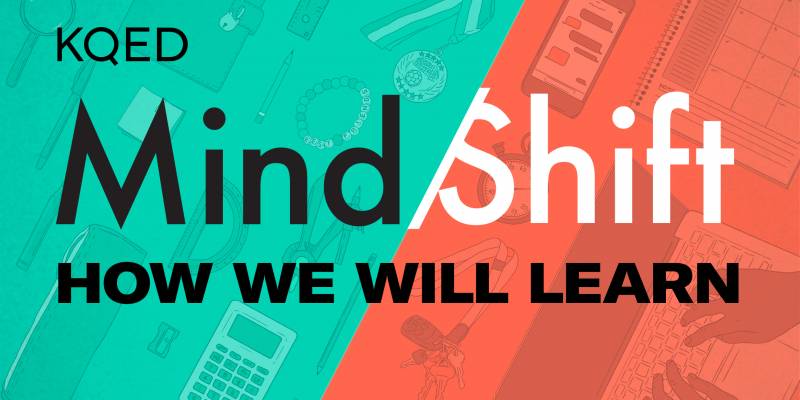The new season of MindShift starts Tuesday, July 19, with new episodes available every other Tuesday through September 27. Find the MindShift podcast for free wherever you get your podcasts, or visit kqed.org/mindshiftpodcast.
Season 7 Schedule
Episode 1: July 19, 2022
Can Artificial Intelligence Find Cheaters?
During remote learning, students had to use virtual proctoring tools to take their tests online. These apps and software can be as extreme as using artificial intelligence to track a students eye movements and keystrokes or as simple as a lockdown browser which prevents students from accessing other pages during the test. Students and caregivers have raised concerns about school pressures, racial bias, privacy and mental health. The rise of these tools and their defects have caused some educators to wonder about trusting students, the importance of cheating and if it’s time to change the way schools test altogether.
Episode 2: August 2, 2022
School Bells or Nah?
Remote learning was far from ideal, but it did open the door for schools to start thinking about new ways to set up school days. Experts cite lack of sleep as a contributing cause of mental health concerns and low academic performance. Many schools are looking for ways to support teenagers and adolescents getting some quality shut-eye. In California, Governor Gavin Newsom made 8:30am school starts for high schools – which can start as early as 7:45am – required by law. We discuss the effect the new law has had on students. We will also explore the possibility of a 4-day school week which would support students and help avoid teacher burnout.
Episode 3: August 16, 2022
Middle School: The Age of Opportunity
A growing body of research shows that the brain’s second most important developmental period (after age 0-3) takes place between ages 10-12 when it is most susceptible to influence, for better or worse. Experts call it the age of opportunity because what happens during this time can lead a child towards greatness. Parents get plenty of advice on how to deal with teens, but little when it comes to tweens. Schools also play an important role in shaping adolescent minds by cultivating positive experiences. We talk with psychologists and a Middle School Teacher of the Year about how to make the most of the tween’s fast changing brain .
Episode 4: August 30, 2022
Yikes! The Kiddos are Pissed!
Across the country, teachers are seeing angry kids. With students returning to in-person learning, there has been an uptick in disruptive behavior, fighting and frustration. Educators are taking the brunt of it with 6 in 10 teachers having experienced physical violence or verbal aggression since the pandemic. Experts point to regression, lack of socialization, and trauma caused from navigating COVID-19 as reasons students are acting out. While there are no quick fixes, teachers and students alike may find answers in a multi-tiered system of support model that includes restorative justice practices. Focusing on improving school culture is a precursor to addressing challenging behavior.
Episode 5: September 13, 2022
Heritage Languages in Schools
For many years, an English-only philosophy dominated teaching in U.S public schools. But, over the past several decades, research has shown not only that learning more than one language is good for the brain, but that celebrating language diversity in school can foster a sense of belonging for students and parents. We explore the complicated dynamics of language in and outside the classroom. What does it mean to speak a different language from one's family? How can teachers celebrate linguistic diversity in their classrooms? We dive into how attitudes about language have changed over time and spotlight the experiences of people trying to learn their heritage languages.
Episode 6: September 27, 2022
Community schools: An Origin Story and a Future?
The pandemic has revealed that teachers have been doing more than just teaching students academics. Long before COVID-19 school closures, teachers were storing snacks in their desk drawer for the occasional hungry student or keeping their classroom open to kids during lunch. While many schools do not have systems in place to support that often invisible work, the community school model provides some strategies to lighten the load on schools and their educators.
Mini-Episodes | Monthly Starting in November | Interviews with Leaders in Education
To better serve listeners between seasons, MindShift will release short episodes monthly for the rest of the year. These will be roughly 10 minute, conversation-styled episodes where one of the MindShift hosts interviews an education researcher or notable teacher.
About MindShift
MindShift explores the future of learning in all its dimensions via its blog, email newsletter, social media accounts and podcast series. It examines how learning is being impacted by technology, discoveries about how the brain works, poverty and inequities, social and emotional practices, assessments, digital games and design thinking and music, among many other topics. We look at how learning is evolving in the classroom and beyond. We also revisit old ideas that have come full circle in the era of the overscheduled child, such as unschooling, tinkering, playing in the woods, mindfulness, inquiry-based learning and student motivation. We report on shifts in how educators practice their craft as they apply innovative ideas to help students learn, while meeting the rigorous demands of their standards and curriculum. MindShift has a unique audience of educators, tinkerers, policy makers and life-long learners who engage in meaningful dialogue with one another on our platforms
Visit us at kqed.org/mindshift and follow us on Twitter at twitter.com/MindShiftKQED and on Facebook at facebook.com/MindShift.KQED
